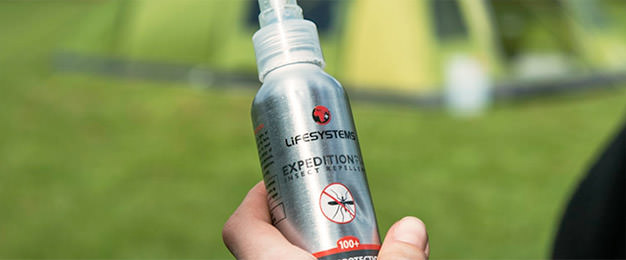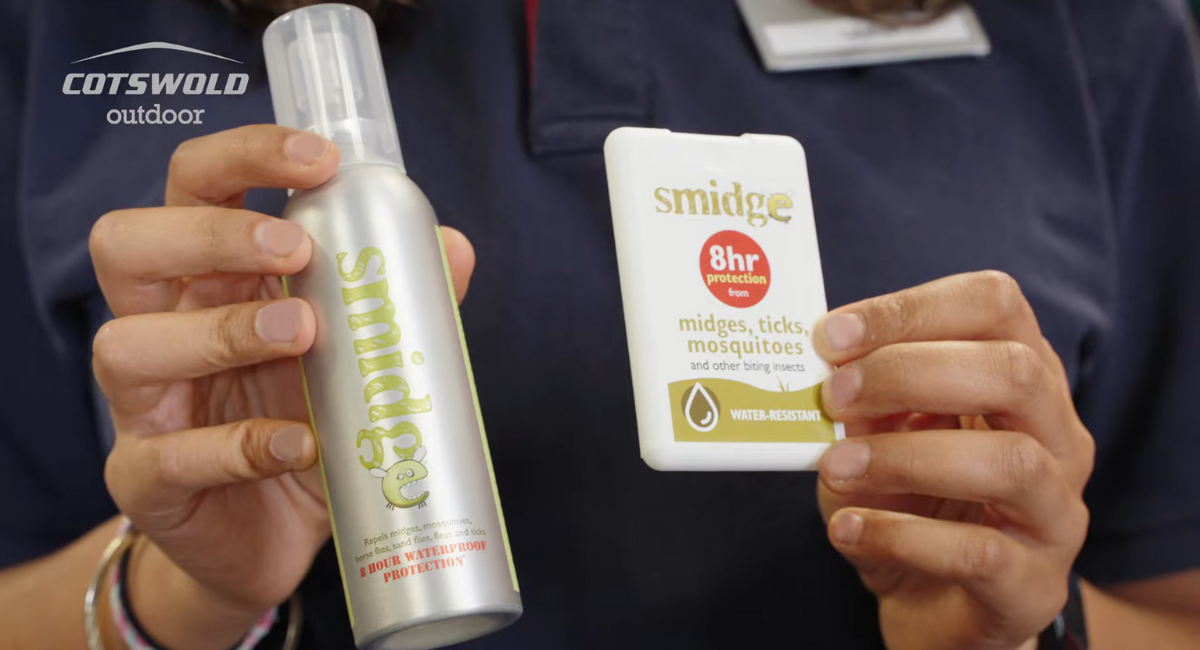Insect repellents are essential products that help prevent bites from mosquitoes, ticks, and other biting insects when spending time outdoors. Choosing an effective insect repellent allows you to enjoy activities like hiking, camping, and picnics without the annoyance and health risks posed by insect bites. Discover key information on insect repellent ingredients, formats, effectiveness, and safety considerations.
What Can Be Used As Insect Repellent?
DEET is one of the most widely used and effective active ingredients in insect repellents. It repels biting pests like mosquitoes, ticks, and flies by blocking receptors in insects that detect carbon dioxide and lactic acid emitted from human skin. Multiple studies have shown DEET repellents provide long-lasting protection from bites when used correctly. It is available in spray, wipe, and wristband format for convenience. Some of the most popular insect repellents in the UK contain around 50% DEET such as Smidge That Midge and Lifesystems Expedition 50 Plus Spray.
Picaridin is another synthetic repellent that works comparably to DEET at warding off mosquitoes and ticks. Picaridin-based repellents like Autan Protection Plus Pump Spray provide robust bite protection similar to high-concentration DEET but with a more pleasant scent and lower skin irritation risk. Picaridin also feels less greasy compared to DEET.
Lemongrass oil extract and citronella oil are two popular natural insect-repellent ingredients derived from plants. These essential oils effectively repel mosquitoes but require reapplication more often than DEET or picaridin. Two top-performing lemongrass and citronella repellents are Incognito Anti-Mosquito Spray and Repel Lemon Eucalyptus Natural.
Wearable insect repellents like mosquito repellent wristbands provide bite protection without needing to directly apply spray onto the skin. The insect-repellent vapours released mimic natural repellent compounds found in human skin. Most wristbands contain citronella or lemongrass oil and last 1-2 weeks before replacement. Major brands include Beaphar Anti-Insect Refill Bands and Snowell Mosquito Repellent Bracelets.
Consider combining sunscreen and insect repellent for simplicity when spending long days outside exposed to both UV rays and biting insects. Certain sunscreens contain integrated insect repellents like Smidge That Midge & Sun Cream. Avoid sunscreen mixing with DEET as this can reduce sun protective effects. Instead, picaridin or plant-based repellents are recommended for pre-combined sunscreen-repellent formulations.
Choosing the Right Insect Repellent
When selecting an insect repellent, it’s important to assess its effectiveness against target insects found in your local area. Mosquitoes can transmit viruses like West Nile through their bites, so areas with high mosquito populations warrant a robust repellent like DEET or picaridin to minimise risk. In tick habitats where Lyme disease is a concern, permethrin sprayed onto clothing provides the best protection against ticks and typically outperforms repellents applied to the skin. Seek out unbiased expert testing to determine the best insect repellents for your needs rather than relying solely on marketing claims. Consumer Reports is one independent testing body providing up-to-date evaluations on repellent efficacy.
Read instructions carefully before use and note if the product is suitable for babies and toddlers. In young children, DEET concentration above 30% is not recommended as skin absorption can be higher leading to toxicity risks if overapplied. Natural repellents with essential oils make good alternatives for kids but need to be reapplied more frequently than DEET or picaridin. Avoid spraying repellent directly onto a child’s hands to reduce the chances of accidental ingestion through hand-to-mouth transfer. Help apply repellent spray to children while avoiding sensitive areas like eyes, mouth and cuts. Reapply insect repellent according to the label directions, typically every 1 to 4 hours. Using expired insect repellent may provide inadequate protection from insect bites.
While most people can safely use DEET, picaridin and other registered insect repellents, skin reactions can sometimes occur including redness, itching, swelling or blistering. Discontinue use of any repellent resulting in a concerning skin reaction. DEET insect repellent can also damage plastics, fabrics and leather so take care spraying directly onto clothing, tents, backpacks and furniture. As with all pesticidal products, use only as directed and store out of reach of children to prevent accidental poisoning. Proper usage provides bite protection with minimal risks.
Popular Natural Insect Repellents
Consumers today have an array of quality natural insect repellents to choose from with major outdoor brands offering effective plant-based bite protection. As public awareness grows regarding synthetic pesticide harms, natural essential oil repellents provide safe alternatives without toxic chemicals. Leading natural repellent companies create innovative formats and blends incorporating proven botanical bite blockers. This section highlights top-performing natural insect repellent products from reputable UK outdoor brands.
One exemplary natural insect repellent company, After Bite, specialises in soothing relief products for existing bug bites and stings in addition to deterring future pesky attackers. Their bestselling After Bite Natural Insect Repellent relies on citronella, peppermint and tea tree oils to fend off midges, mosquitoes and flies for up to 4 hours between applications. Available in both spray and balm sticks, this gentle repellent formula moisturises skin while repelling insects naturally. For those suffering nasty bites, After Bite’s anti-itch pens and gel provide pramoxine numbness and antihistamine relief from swelling, itchiness and redness.
Renowned for quality outdoor gear, Lifesystems offers hardy natural insect repellents keeping explorers bite-free. Their Mosi-guard Natural pump spray harnesses a concentrated 50% citronella oil formula deterring mosquitoes, midges and black flies for a solid 6 hours - longer than many low-concentration DEET repellents. Lifesystems also produces Mosi-guard Natural wipes for portable insect shielding and an unscented version ideal for hunters.
Smidge pursues a vegan approach within their popular That Midge natural insect repellent collection trusted by outdoorsy families. That Midge Natural spray utilises plant oils of soybean, citronella, peppermint and lemongrass to turn away midges, gnats and mosquitos for 3-4 hours. rounding out their eco lineup, Smidge’s alcohol-free suncream mingles natural oils and mineral filters with a dash of citriodiol repellent from eucalyptus plants, earning acclaim as a chemical-free protector.
For 30 years, Thermacell has pioneered outdoor relief innovations like their Mosquito Repellent Appliances which eliminate bug bites within 15 feet. Powered by butane cartridges, Thermacell devices generate a virtually odourless zone shielding users from mosquitos without sprays or skin applications – handy for yards, patios, porches and camps. Newer rechargeable models like the Patio Shield allow cordless convenience keeping backyard BBQs and events pest-free.
Trekmates stands out for specialising in equipment-enhancing outdoor pursuits like their Natural Repellents product line defending travellers from troublesome insects abroad. Products like Trekmates Natural Mosi-guard DEET free spray containing 50% citronella guard against mosquitos, midges and blackflies for up to 5 hours with its convenient pump bottle. Whether seeking defence from Zika carriers or Scottish midges, Trekmates natural repellents protect international escapades from disruptive bug bites.
Essential Oils as Natural Repellents
Choosing an eco-friendly natural insect repellent ensures biting pest deterrence without introducing harsh chemicals. While plant-based repellents effectively protect against mosquitoes, midges and fleas, they generally don’t last as long as synthetic versions before reapplication. Finding the right natural insect repellent means identifying which essential oil works best for repelling your main nuisance.
Citronella oil has roots as one of the very first insect-repellent ingredients dating back over 50 years. This lemon-scented oil extracted from Cymbopogon grass continues to be a popular natural mosquito repellent component today. High concentrations between 30 to 50% citronella oil are most effective with 2 to 4 hours of longevity per application. Repel Citronella Candle and Incognito Anti-Mosquito Spray utilise this proven oil.
Eucalyptus oil, especially that extracted from the lemon eucalyptus tree, has been consistently rated as one of the most effective plant-based repellents in recent testing. Eucalyptus oil provides durable repellency qualities similar to low concentrations of DEET, warding off ticks in addition to mosquitoes. Products featuring lemon eucalyptus oil like Repel Lemon Eucalyptus Natural Spray protect against bites for up to 6 hours.
Peppermint oil’s main constituent menthol outperforms DEET at deterring mosquitoes and flies in laboratory studies while also repelling spiders, roaches and ants. For an all-purpose natural bug repellent, Badger Anti-Bug Balm with rosemary, citronella and peppermint oils helps keep back various annoying insects.
No matter if choosing a synthetic or natural insect repellent, apply it before going outdoors anytime mosquitoes are active. Reapply frequently, especially after swimming or sweating. Keep safety considerations in mind and enjoy the outdoors protected from irritating insect bites.
Protecting Yourself Outdoors
Spending extended time outdoors camping or hiking increases the risks of biting insects carrying diseases. Protect yourself by utilising a layering system with insect shields like permethrin-treated clothes, repellent DEET lotion and mosquito net tents. Take preventative oral medications when travelling in malaria hotspots abroad as extra illness prevention. Understanding insect behaviour also allows smart strategies for reducing exposure.
Dawn and dusk represent peak mosquito biting times as mosquitoes shelter in shady vegetation during the day before emerging to seek warm-blooded hosts at twilight. Curtail outdoor activities during high mosquito activity periods or apply repellents conservatively throughout the day if staying outside. Clothing with long sleeves, pants and hats minimises biting surfaces. Further mosquito protections come from mesh jackets like the Lifesystems Mosquito Head Net Hat for complete coverage. Electric bug zapper lanterns emit attractants drawing in mosquitoes to their demise, functioning as tactical strike forces diverting biters away from people.
For treks in tick-infested areas, treat clothes, tents and gear with permethrin sprays which bind tightly to fabrics and remain potent through multiple washes. The chemical paralyses and kills ticks on contact acting as lethal armor against hitchhiking ticks. Dietary choices may also thwart mosquito attraction - eating garlic capsules and taking B vitamins have shown repellent effects in studies. Inspecting skin nightly and removing embedded ticks quickly aids in early Lyme disease prevention.
Through smart layering of protections from treated apparel to chemical and herbal insect repellents, enjoying the great outdoors needn’t require excessive worrying about insect dangers. Pay attention to any symptoms after travel and mention insect exposures when seeking medical care for timely diagnoses and treatment of insect-related illnesses.
Repelling Bugs While Hiking & Campin
Hiking and camping allow adventurers to bask in nature’s splendour, however, the wilds contain irritations that can quickly sour outdoor experiences. Protect your expedition from swarming bugs with practical repelling and deterrent techniques tailored for backcountry boondocking. Mosquito populations peak from late spring through summer depending on location so plan accordingly if seeking to evade vampire hoards.
Ultralight essentials like permethrin pretreated exercise clothing fend off ticks before they bite. Permethrin binds extremely well to fabrics, remaining potent through 70+ washes while also repelling mosquitoes landing on protected apparel. Treat felt hats for additional safety since ticks often drop down from vegetation above. Wear brighter colours over dull tones to make ticks crawling on clothes more noticeable before they reach the skin.
Natural plant oil repellents make handy companions defending exposed skin, and some are now available for mess-free application. Options like Repel Lemon Eucalyptus Towelettes, containing 40% lemon eucalyptus oil, deliver protection rivalling low DEET concentrations without synthetic chemicals. For prolonged defence, high-concentration DEET or picaridin sprays work best applied strictly according to label directions.
Campsite choices influence bug pressure - seclude tents away from stagnant water mosquito breeding grounds. Sleep off the ground using camping hammocks to create separation from crawling nighttime nibblers. Install guyline perimeter insect barriers on tents to reduce uninvited guests. Topical anti-itch sticks like After Bite relieve symptoms of successful infiltrators. Battery-powered aspirators allow bite sufferers to extract a modicum of revenge!
Don’t let bloodsuckers prevent you from journeying into spectacular natural landscapes. Employ layers of defence from potent repellents, protective clothing and smart camp planning for vigorous adventures spared from insect harassment. Outsmart biting bugs through countermeasures revealing the true splendour of remote destinations at their peak...uninterrupted by incessant scratching!
Related articles

Let us know you agree to cookies
We use marketing, analytical and functional cookies as well as similar technologies to give you the best experience. Third parties, including social media platforms, often place tracking cookies on our site to show you personalised adverts outside of our website.
We store your cookie preferences for two years and you can edit your preferences via ‘manage cookies’ or through the cookie policy at the bottom of every page. For more information, please see our cookie policy.




